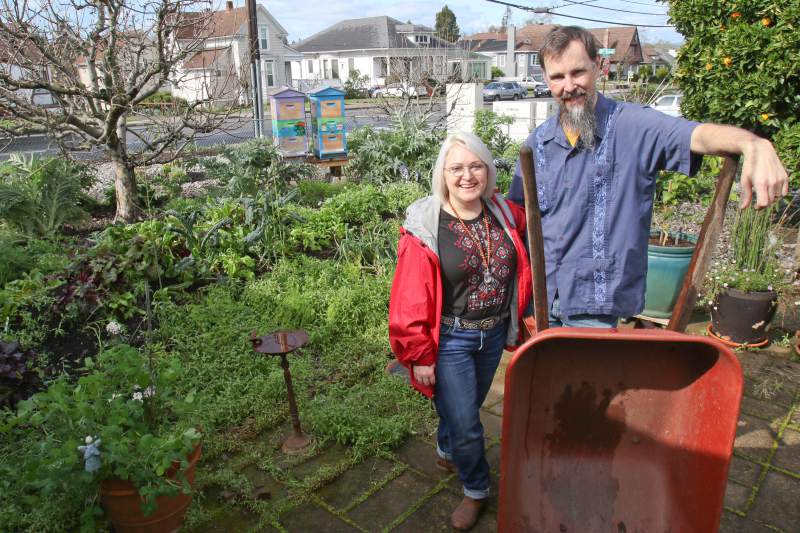At first glance, the yard on the corner of 8th and B streets looks like any other neatly kept, early spring garden in the cozy west Petaluma neighborhood.
Clean gray river stones frame newly budding fruit trees, mature kale and chard plants pump out their nutritious offerings and a flowering quince attracts buzzing bees. But, on a closer look, the garden reveals a deep level of organization: it’s a food forest that mirrors the different levels of plants found in a natural forest.
The ground is covered with succulents that conserve water and out compete weeds, beneficial plants like yarrow and artichoke surround the fruit trees and feed the soil and there’s a living canopy that helps shade and protect the bee boxes when they need it most. There’s also a serpentine “hugelkultur” raised bed made from interwoven wood and compost — an ingenious German technique that remarkably conserves water and improves soil health.
Everything in this small space was planted with intention and, as longtime Petaluman Tiffany Renée, a designer and custodian of this permaculture garden, explained, the goal is to reap multiple yields from limited resources. In this case, the yields include an abundance of produce and a place for the community to gather and learn.
“The average person would have probably thought of putting up a five-foot fence because there’s no privacy,” Renée said. “Instead, we’ve chosen to engage with our neighbors and ask ‘why is this important?’ ”
To Renée and her husband, Jaimey Walking Bear, who moved to the property in October 2014, the garden is important on many levels. It’s the cornerstone of their homestead, which they call “8th and Bee,” and a gateway to a larger online project they’ve named the Resilience Guild.
Like many avid gardeners in Sonoma County, Renée and Walking Bear, who reside in the 1920s-era home on the property, discovered the wealth of knowledge within the community about sustainable agriculture and building “resilience” and wanted to share it. The pair has harnessed their backgrounds in event organizing, talent management and web development to create a blog, photo and video gallery and an online course called “Tierra: Online,” a series of conversations with experts including Trathen Heckman of Petaluma-based sustainability nonprofit Daily Acts and Sara McCamant from the Sebastopol’s Ceres Project on topics including permaculture, soil science and seed saving.
Renée, Petaluma’s former vice mayor, said she comes from a family of green thumbs, and has always been a bee-lover and gardener. In 2011, she completed an intensive permaculture training course through Daily Acts, which expanded her gardening knowledge and, she said, informed her work as an elected representative.
Her experience in community organizing and her passion for growing plants of all sorts (including indigo for the local Fibershed movement) have found a literal home in the 8th and Bee project.
Walking Bear, on the other hand, is a more recent convert to the gardening faith.
His family moved to Petaluma when he was 3 and, as he explained, gardening was mainly about weeding — something he didn’t want to have anything to do with. However, after working for most of his life in the “non-stop” world of restaurants, retail and tech, he said now that he’s “older” he craves more quiet space.
“This is peace for me. There is never any shortage of joy and it offsets the hecticness,” he said, as Renée added that she handles the weeding.
Renée and Walking Bear couldn’t have found a more appropriate spot to manifest their vision to engage the community through growing food.
The busy corner is the pathway for kids walking home from school, mothers strolling with newborns and people walking their dogs.
And if the juicy sweet oranges at the honor-system farm stand don’t draw people in, the brightly painted bee boxes and black and white skeleton Dia de Los Muertos plastic flamingoes surely will.
The extra time they spend talking with intrigued neighbors makes gardening chores take a little longer, said Renée, but the opportunity to educate people about the value of “planting guilds” or carbon sequestration are a fair trade.
“It would be a disservice to community not to engage neighbors and start to think of our neighborhood as food network,” Walking Bear said.
Plus, they’ve been given a chance to carry on the legacy of the family who owns the property. The patriarch, George, recently passed away, but he left evidence of the yard’s growing potential in the form of a 45-year old grafted Gravenstein apple tree, a 25-year-old Golden Delicious apple and the overflowing orange tree that Renée and Walking Bear lovingly care for.
They’ve also been applauded by neighbors for the “creative re-location” of over 1,000 cubic feet of rock which was added by George’s family to dissuade future renters from an unkempt yard. In a similar vein, juniper was planted in the front yard which Renée has now beautifully bonsaied. In fact, she said, the new look is easing the landlords into the idea of completely taking it out to make room for food cultivation.
The potential of a small yard to significantly add to a sustainable ecosystem that is quietly demonstrated by the 8th and Bee Homestead might also be rubbing off on the neighbors. Renée and Walking Bear said they have noticed a proliferation of vegetables growing in front yards all around town.
And while they don’t believe it’s all due to their project, it doesn’t hurt that their homestead is living proof that a small space can have a big impact.
If you want a close-up look at the 8th and Bee Homestead, it will be part of the free self-guided Eco-Friendly Garden Tour on April 30 in Sonoma and Northern Marin Counties sponsored by Daily Acts, the Sonoma-Marin Water Saving Partnership and the California Native Plant Society Milo Baker Chapter. For more information, visit www.8thnbee.com.



